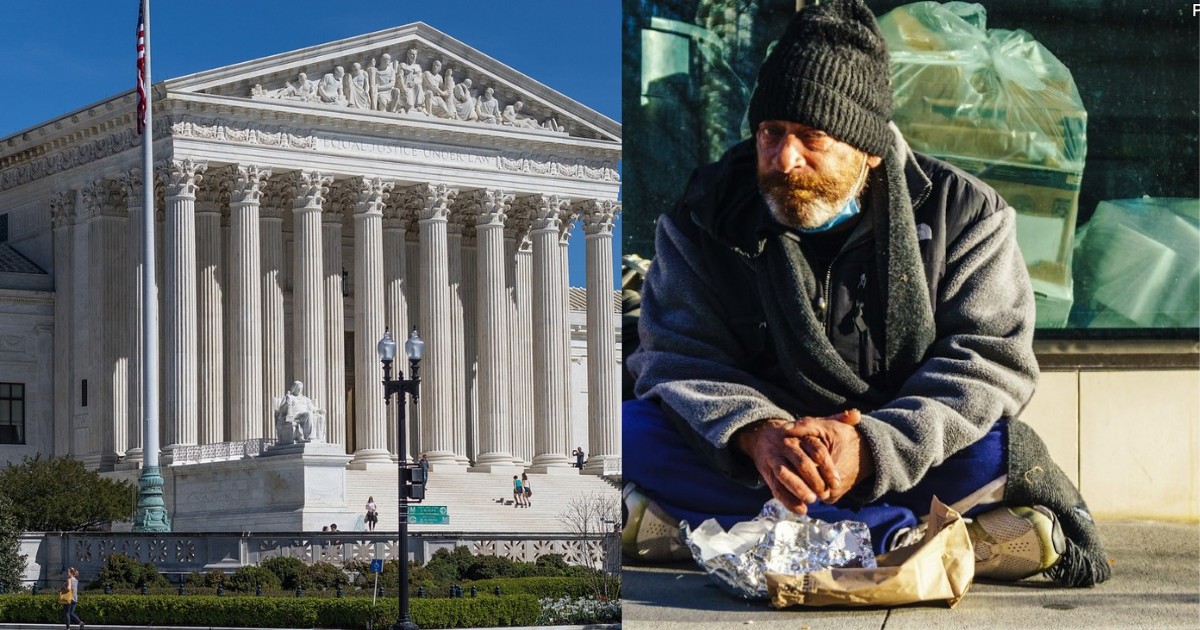While conventional wisdom suggests that the 2024 Presidential Election will be determined by the economy, border security, and foreign policy, there could be two underlying factors in this year’s election cycle. Parental rights and private property rights.
The U.S. Supreme Court is hearing a case that could add a third issue – public property rights. The question before the court is whether governments can ban or fine people from sleeping in public spaces.
What right do governments have to restrict the public from public land use? In this case, it’s homelessness, but the Court’s decision could affect all levels of government and all public lands including state and national parks. It could, in fact, determine if a fine is a cruel and unusual punishment for a citizen who commits a misdemeanor.
The 9th U.S. Circuit Court of Appeals in San Francisco ruled that towns cannot ban camping in public spaces when shelter is unavailable. They did give the town the right to pass laws against public urination and littering. The city of Grants Pass has just one overnight homeless shelter. They based their ruling on the 8th Amendment’s ban against cruel and unusual punishment. What is the punishment that Grants Pass inflicts upon violators of this misdemeanor? A fine.
This case touches a lot of rails – personal rights, public property rights, government responsibility to protect lands for future generations, punishment for misdemeanors, government responsibilities to provide shelter for their citizens, and I’m sure many, many more issues.
Normally, when you read statistics in news reports it is from the Dept. of Housing and Urban Development’s point-in-time report, the latest taken January 2023. This report counts all people who are homeless at that point and doesn’t give a fair report to the American people of how to help those who need and want help versus those who either don’t want help or have mental or drug issues that require more help than just a roof over their head.
This will be an interesting case where lawyers for Grants Pass will argue that public property rights and the government’s responsibility to make those properties accessible to all in a safe and fair manner outweigh the rights of specific individuals to utilize public properties at their convenience and at the expense of public safety, other members of the public, and future generations.
One Florida law that could be affected is Florida’s rule in State Parks that limits camping in campgrounds to 14 nights in a row.
Florida’s campgrounds fill up during winter months and this rule is in place to give everyone in the public a chance to utilize camping in our state parks. Florida State Parks also restrict sleeping overnight in your car and require that people sleep in a campsite, cabin, or lodge.
If the U.S. Supreme Court rules in favor of homeless populations, many questions will have to be answered.
1. Would the homeless be required to stay in a shelter if one is available? This would open up more lawsuits with homeless advocates claiming that shelters are akin to jail.
2. If a fine is cruel and unusual for the homeless, is a fine also cruel and unusual for other misdemeanors like speeding?
3. If every individual has the right to public lands instead of these lands being protected for the public at large and future generations, would an individual be allowed to cut down a tree to sell it or use it to help alleviate their homelessness? What about mining? Drilling for oil? Remember that since the Citizens United U.S. Supreme Court case, corporations are people too.
4. Does the government have the responsibility to provide shelter in general or do they have a responsibility to provide shelter to every single person who is homeless in their community that day? And, if this is the case, who is going to determine that the government is in violation and what fines will the government have to pay?
5. What is the ultimate cost to taxpayers who not only lose access to public property because it has been compromised by individuals, but how much will taxes go up due to the mandates of such a ruling?
6. Does the government have a responsibility to protect future lands and public spaces for future generations? Or, does the “right” of the individual today reign supreme?
Homeless advocates are basically asking to take collective, public property and make it private ownership because possession is 9/10 of the law.
can’t imagine the U.S. Supreme Court does anything but overturn the liberal 9th U.S. Circuit Court of Appeals short-sighted ruling that strips a local government’s responsibility to manage their public property in a safe manner for all.











